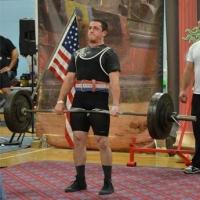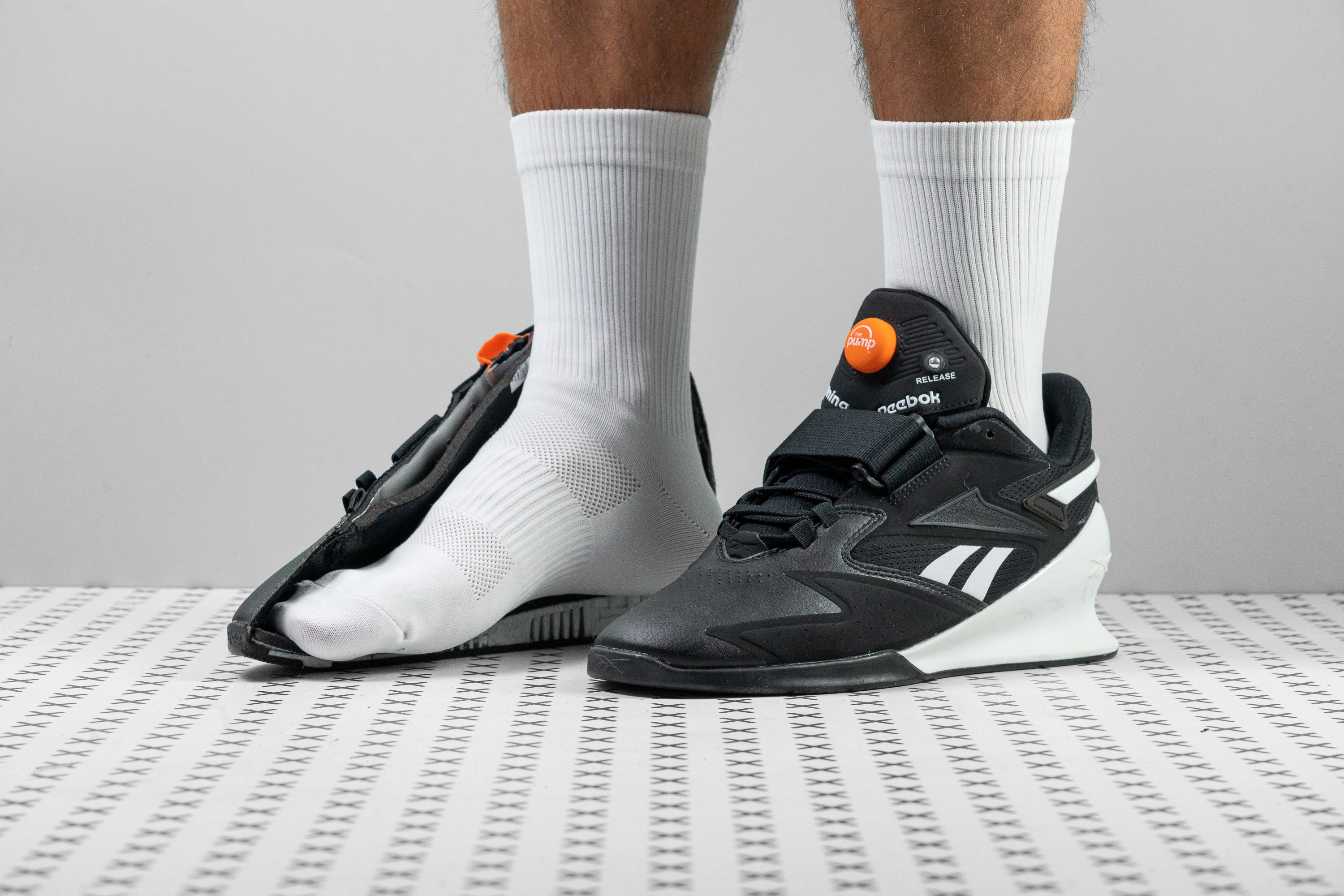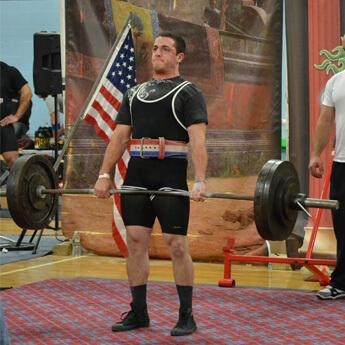Our verdict
- Top pick in best weightlifting shoes
- Top pick in best powerlifting shoes
Pros
- Mind-blowing stability
- Incompressible platform
- High heel helps with posture for squats
- Highly supportive upper
- Top-notch durability
- The Pump feature is fun and improves the fit
Cons
- Unreasonable price hike
- Short Velcro attachment
Audience verdict
Comparison
The most similar training shoes compared
+ + Add a shoe | |||||
|---|---|---|---|---|---|
| Audience score | 87 Great! | 91 Great! | 90 Great! | 87 Great! | |
| Price | £220 | £185 | £90 | £115 | |
| Use | WeightliftingGymPowerlifting | WeightliftingGymPowerlifting | WeightliftingGymPowerlifting | WeightliftingGymPowerlifting | |
| Shock absorption | Low | Low | Low | Moderate | |
| Energy return | Low | Low | Moderate | Moderate | |
| Traction | Low | - | High | - | |
| Drop lab | 20.5 mm | 20.5 mm | 15.2 mm | 15.1 mm | |
| Heel stack lab | 33.0 mm | 33.5 mm | 30.0 mm | 26.0 mm | |
| Forefoot | 12.5 mm | 13.0 mm | 14.8 mm | 10.9 mm | |
| Weight lab | 22.1 oz / 627g | 20.1 oz / 571g | 15 oz / 425g | 14.8 oz / 420g | |
| Breathability | Warm | Warm | Warm | Moderate | |
| Width / fit | Medium | Medium | Narrow | Narrow | |
| Toebox width | Narrow | - | Narrow | Narrow | |
| Size | True to size | Half size small | True to size | Half size small | |
| Midsole softness | Firm | Firm | Firm | Firm | |
| Stiffness | Stiff | Stiff | Stiff | Stiff | |
| Torsional rigidity | Stiff | Stiff | Stiff | Stiff | |
| Heel counter stiffness | Stiff | Stiff | Stiff | Stiff | |
| Toebox durability | Good | Decent | Decent | Decent | |
| Heel padding durability | Good | - | Bad | Decent | |
| Outsole durability | - | - | Decent | - | |
| Midsole width - forefoot | Very narrow | Wide | Narrow | Very wide | |
| Midsole width - heel | Average | Wide | Very narrow | Very wide | |
| Widths available | Normal | Normal | Normal | Normal | |
| Insole thickness | Average | Very thick | Average | Thin | |
| Outsole thickness | Average | Average | Very thick | Average | |
| Outsole hardness | Very soft | Very hard | Average | Very hard | |
| Heel tab | None | None | Pull tab | None | |
| Tongue: gusset type | None | Bootie | None | Both sides (semi) | |
| Tongue padding | Thick | Very thick | Average | Average | |
| Ranking | #18 Top 49% | #5 Top 14% | #10 Top 28% | #16 Top 44% | |
| Popularity | #16 Top 44% | #5 Top 14% | #12 Top 33% | #19 Bottom 48% |
Who should buy
In our opinion, the Reebok Legacy Lifter III is a great investment for the advanced athletes who:
- regularly lift more than 300 pounds
- need a high heel to promote the correct squat posture
- participate in weightlifting competitions

Who should NOT buy
The Legacy Lifter III is very similar in design to the previous Lifter II but costs £20 more. If you want to be savvy about this purchase, we recommend checking out the current discounts for the Legacy Lifter II.
If you haven't trained in a lifting shoe before, we think that the 0.8-inch (20.5 mm) heel elevation of the Legacy Lifter III may be too much for you. Try going with a lower heel of the Adidas Powerlift 5 or the Nike Savaleos instead.
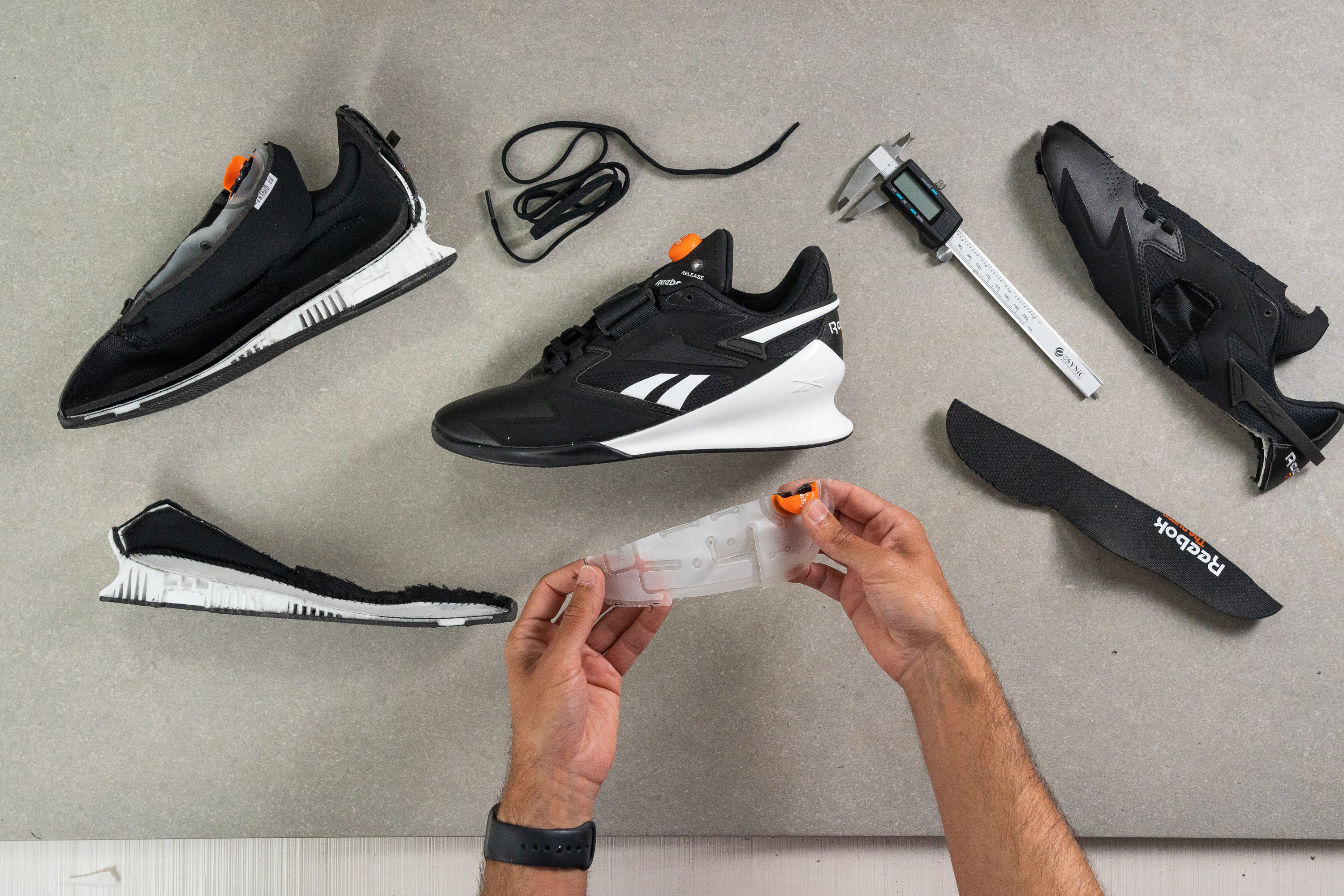
Platform
Shock absorption
The Legacy Lifter III's incredibly stiff and sturdy TPU platform ensures no give aside from a slight compression in its foam insole.
With a super low shock absorption reading of 33 SA in the heel and 29 SA in the forefoot, this Reebok shoe guarantees no loss in power transfer from your feet to the barbell.
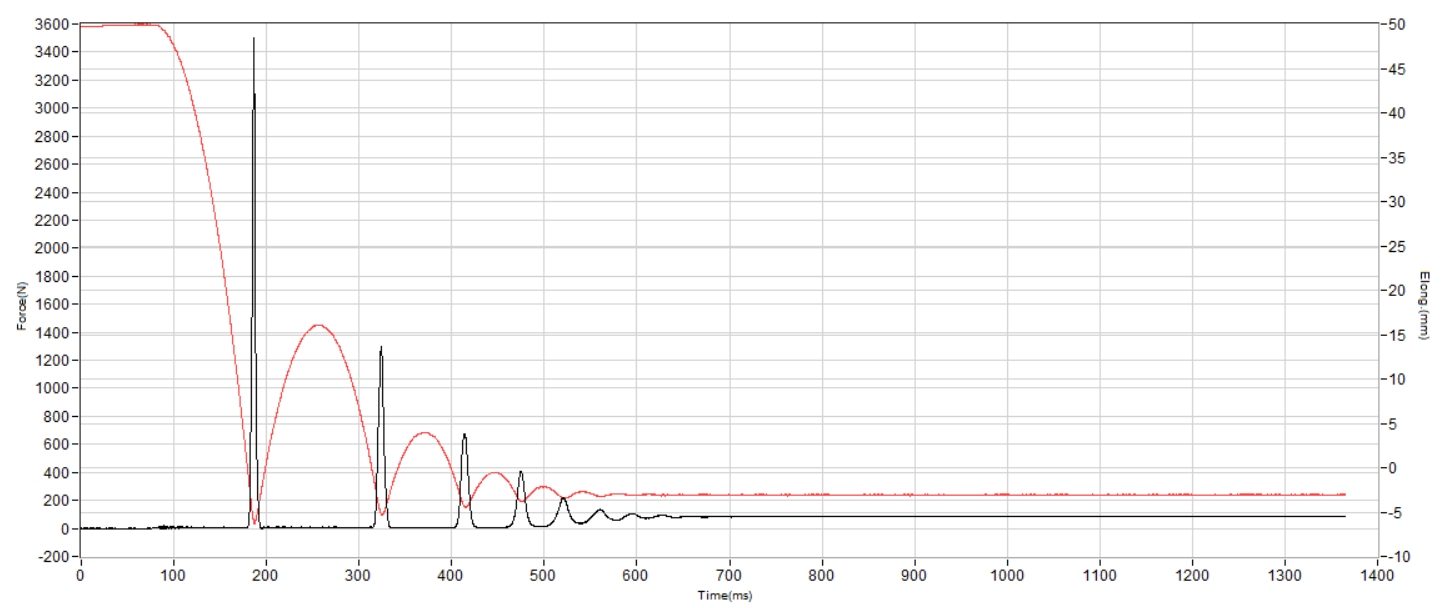
| Legacy Lifter III | 33 SA |
| Average | 48 SA |
Energy return
The shoe's energy return is at our all-time minimum as well, showing only 38.6% in the heel and 37.9% in the forefoot. Again, this is only due to he compression happening in the shoe's insole.
| Legacy Lifter III | 38.6% |
| Average | 47.0% |
Heel stack
As an advanced lifting shoe, the Legacy Lifter III is also one of the tallest. Using a caliper, we measured that the shoe's heel height is 33 mm.
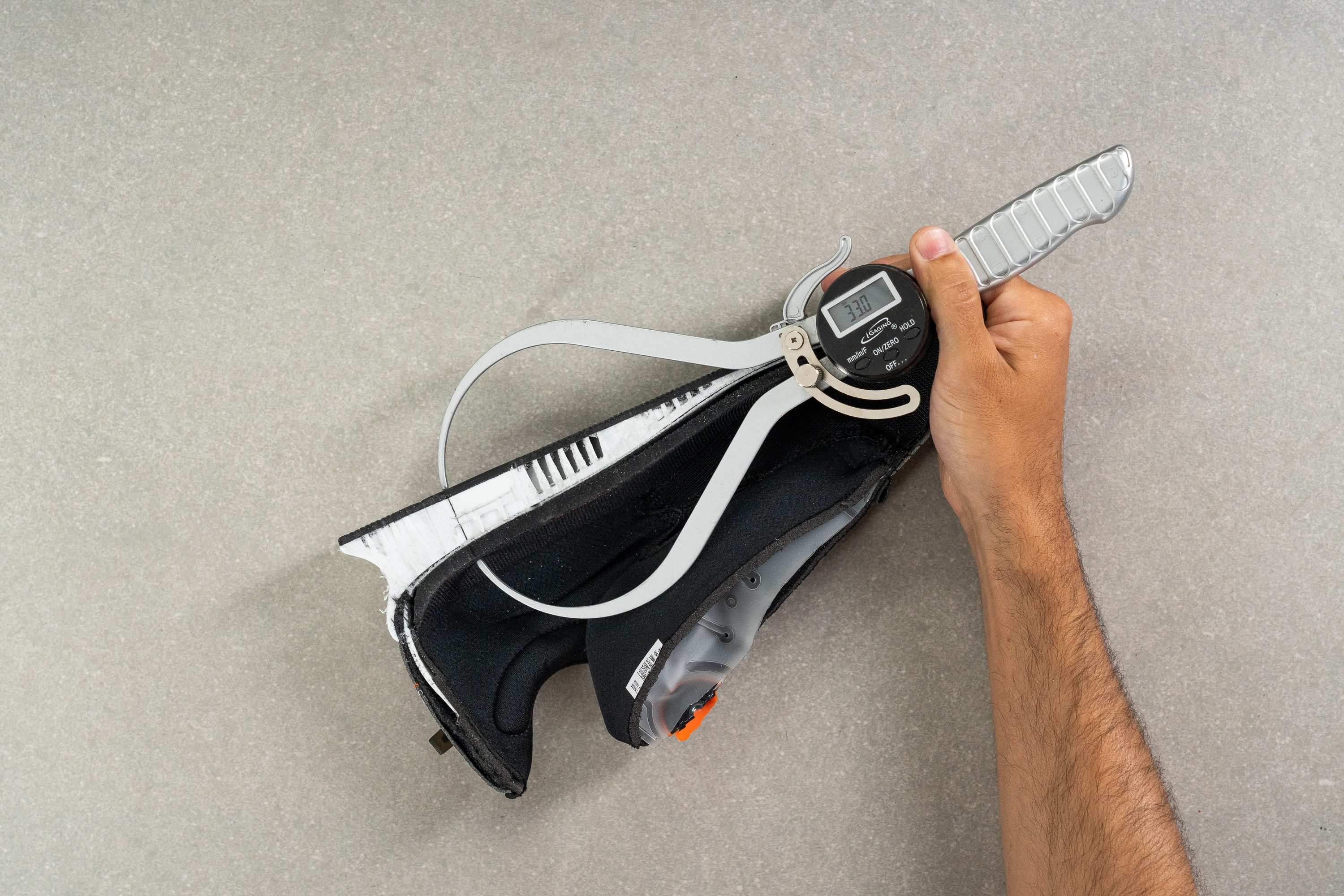
| Legacy Lifter III | 33.0 mm |
| Average | 28.3 mm |
Forefoot stack
The forefoot, on the other hand, is much thinner, 12.5 mm. As you can see, there is a pretty significant "slope" in this Reebok shoe.
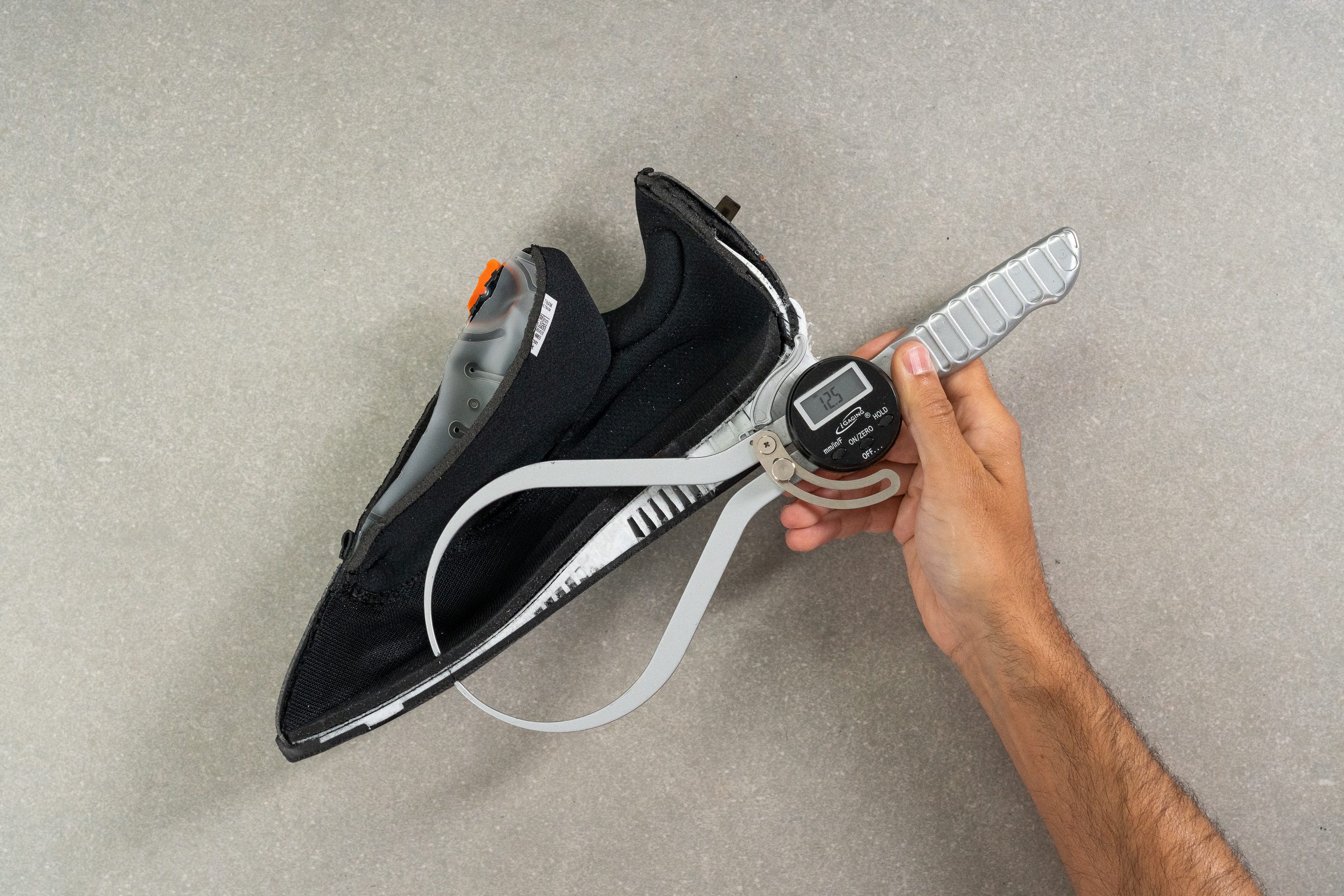
| Legacy Lifter III | 12.5 mm |
| Average | 12.9 mm |
Drop
Based on the stack measurements above, we found that the drop (aka the effective heel height) of the Legacy Lifter III is 20.5 mm. This is a little lower than the officially stated 22 mm, which can be a bit misleading for seasoned athletes who feel these minor differences.
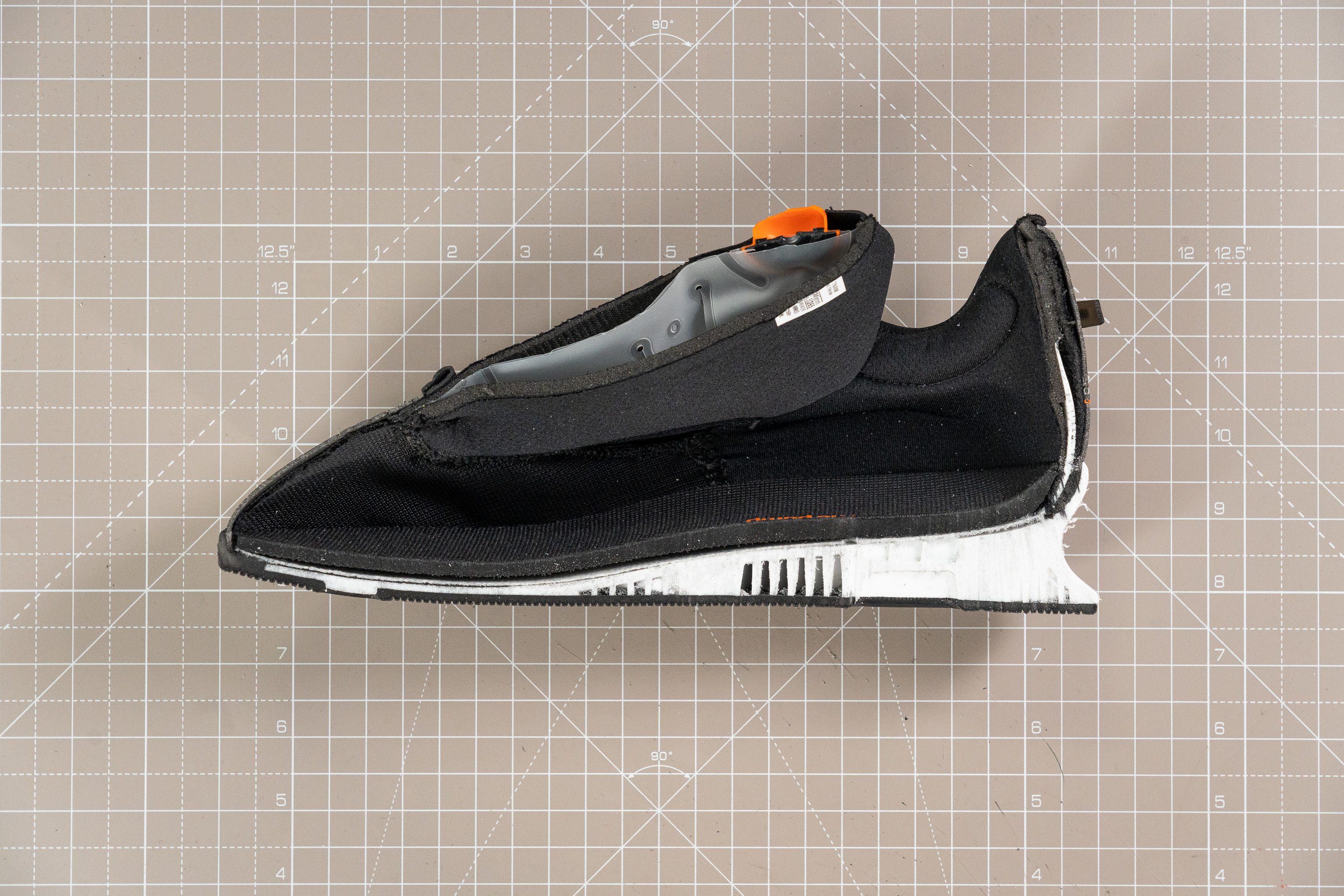
On the bright side, it is still a very significant heel elevation. We definitely felt the benefits of the correct angles that this drop created in the ankles, knees, and hips.
It is a recipe for new personal bests for sure!
| Legacy Lifter III | 20.5 mm |
| Average | 15.4 mm |
Platform firmness
Rest assured that the shoe's TPU platform will not compress even by a hair. It is among the sturdiest we've ever seen, with a durometer measurement of 95.1 HA.
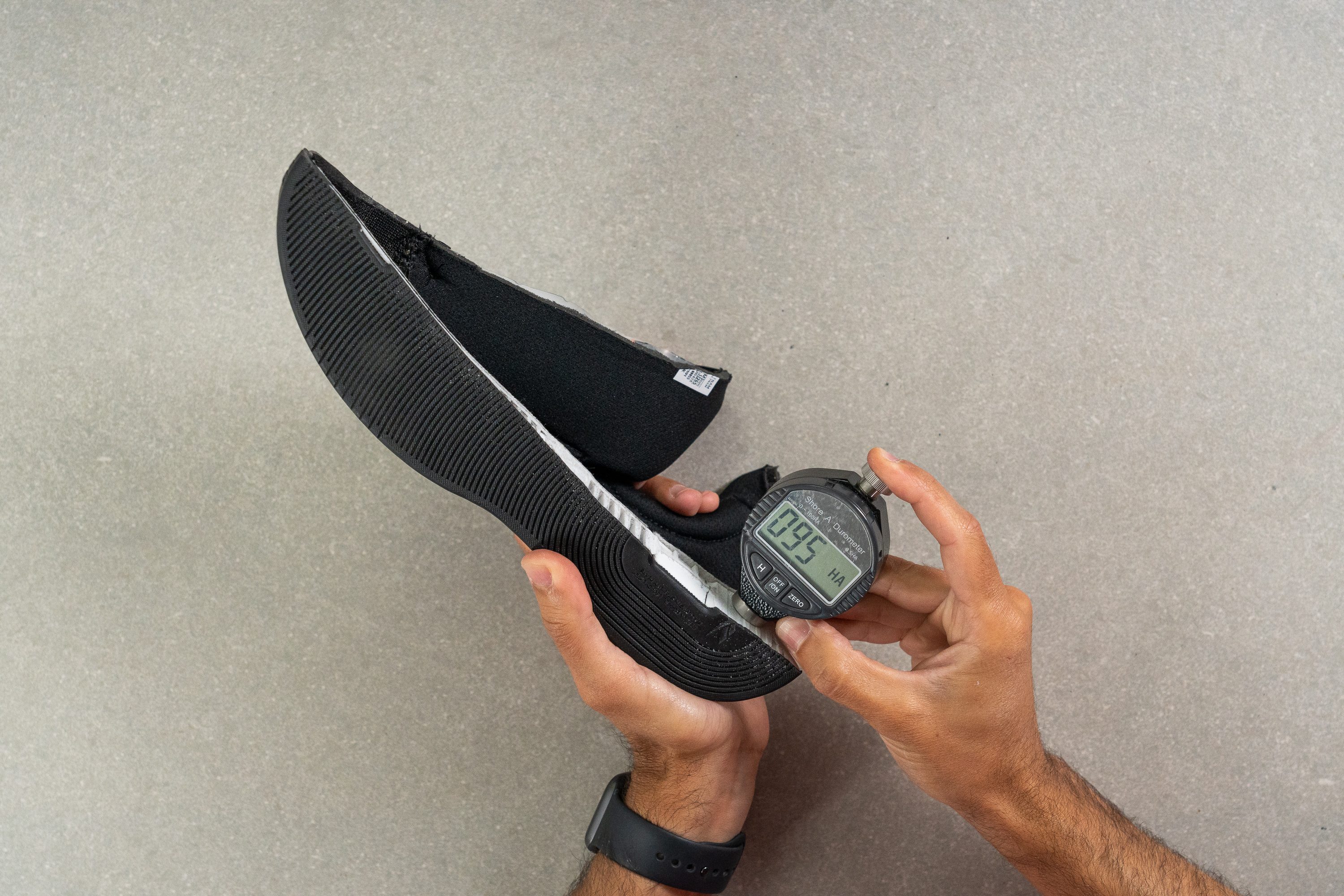
| Legacy Lifter III | 95.1 HA |
| Average | 69.2 HA |
Size and fit
Size
Reebok Legacy Lifter III fits true to size (15 votes).
Width / Fit
Despite its overall snug fit, we found the Reebok Legacy Lifter III to be a more spacious lifting shoe.
The gel mould of its interiors confirmed that with an above-average reading of 94.8 mm. However, when we look at the toebox width and height, things change significantly.
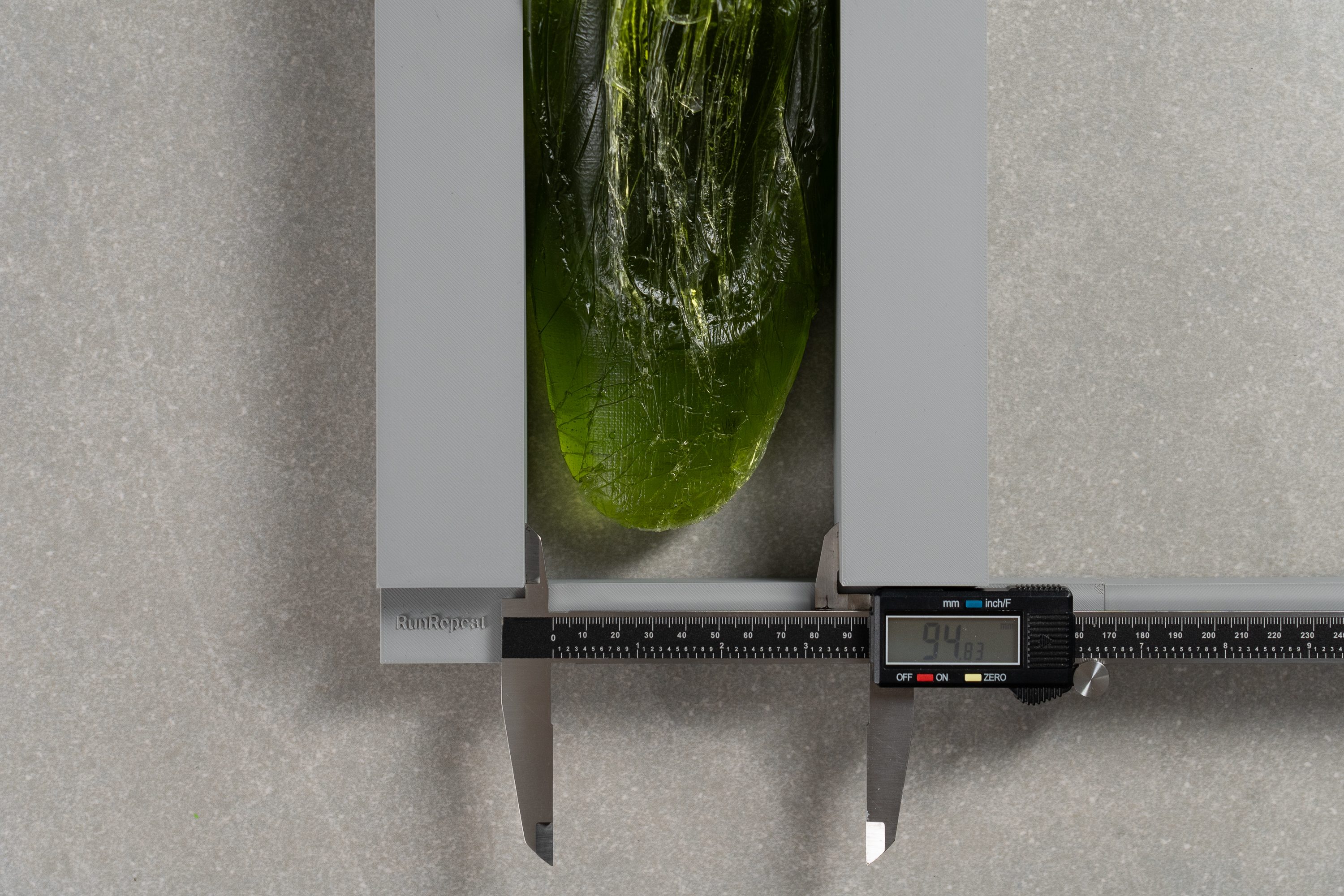
| Legacy Lifter III | 94.8 mm |
Toebox width
However, the shoe's toebox gets notably narrower towards the toes which results in a pretty small reading of 64.6 mm.
On the bright side, that snugness is necessary for your stability and power transfer as it eliminates all undue shifting and wiggling inside the shoe.
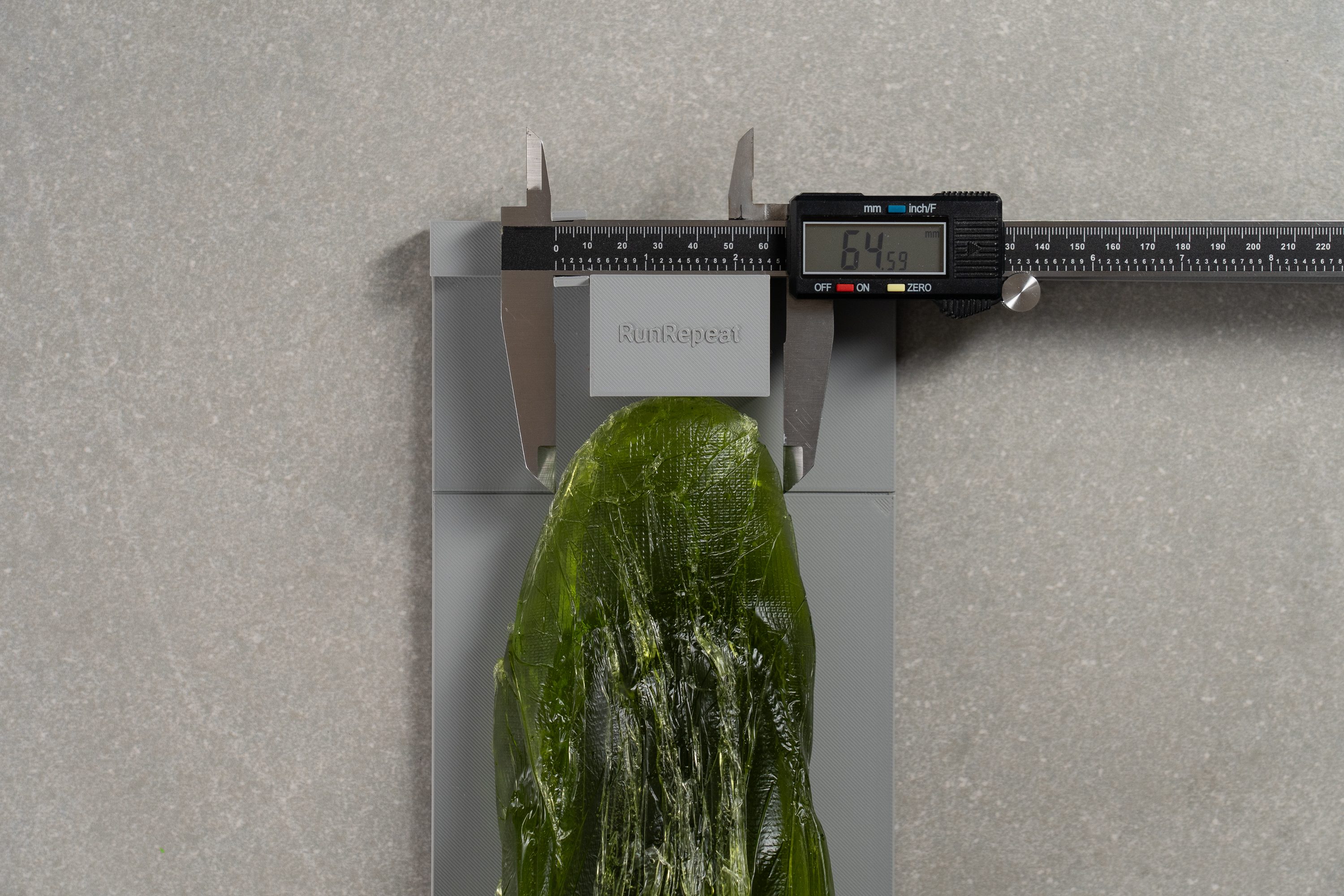
| Legacy Lifter III | 64.6 mm |
Toebox height
The Lifter's shallow toebox and thick leather upper also contribute to the locked-in feel. We measured its toebox height at only 19.3 mm - notably lower than average.
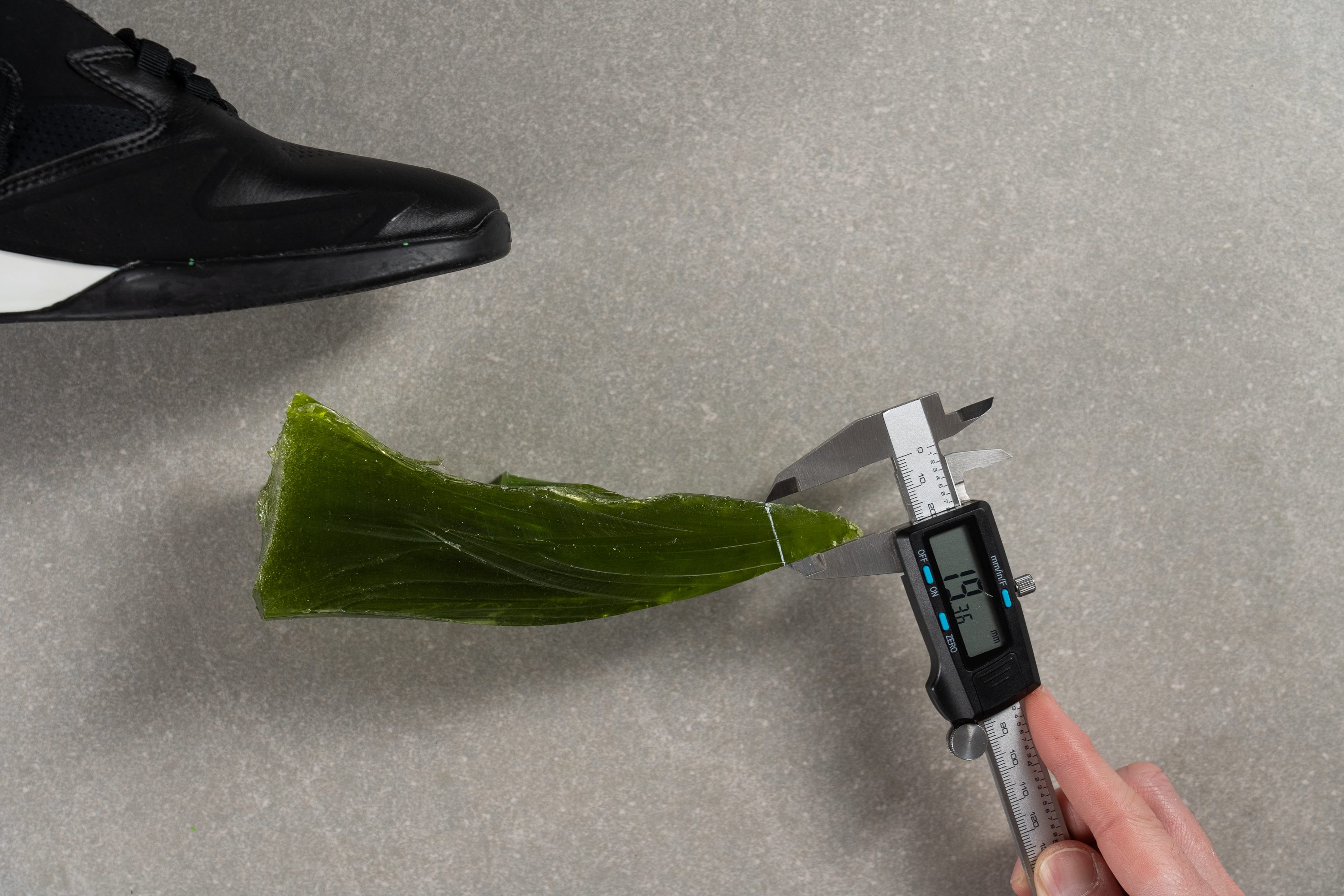
| Legacy Lifter III | 19.3 mm |
The Pump
Some find it gimmicky, others find it nostalgic.
We think that the Pump is pretty cool and is actually helpful in locking down the foot.
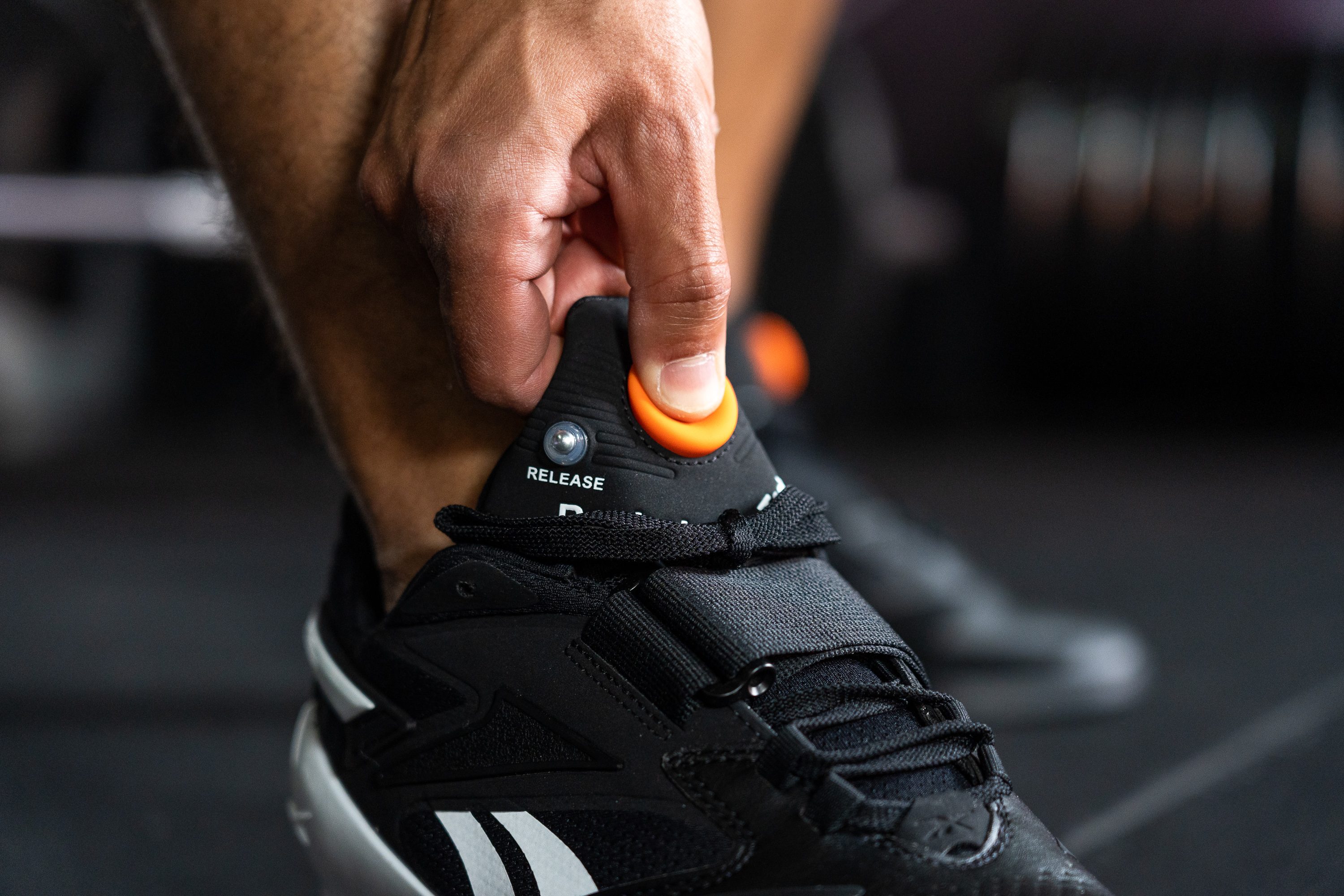
Pushing the button inflates the tongue which in turn fills up the space around the instep and the ankle. As a result, we felt a more secure "hug" and support in the upper.
We think that this is going to be life-saving for people with narrower feet who often struggle to achieve a secure fit with a Velcro strap alone.
Traction / Grip
The grip is incredibly solid in the Legacy Lifter III. With its ribbed and slightly soft rubber, the shoe bites rubber floors and wooden platforms admirably!
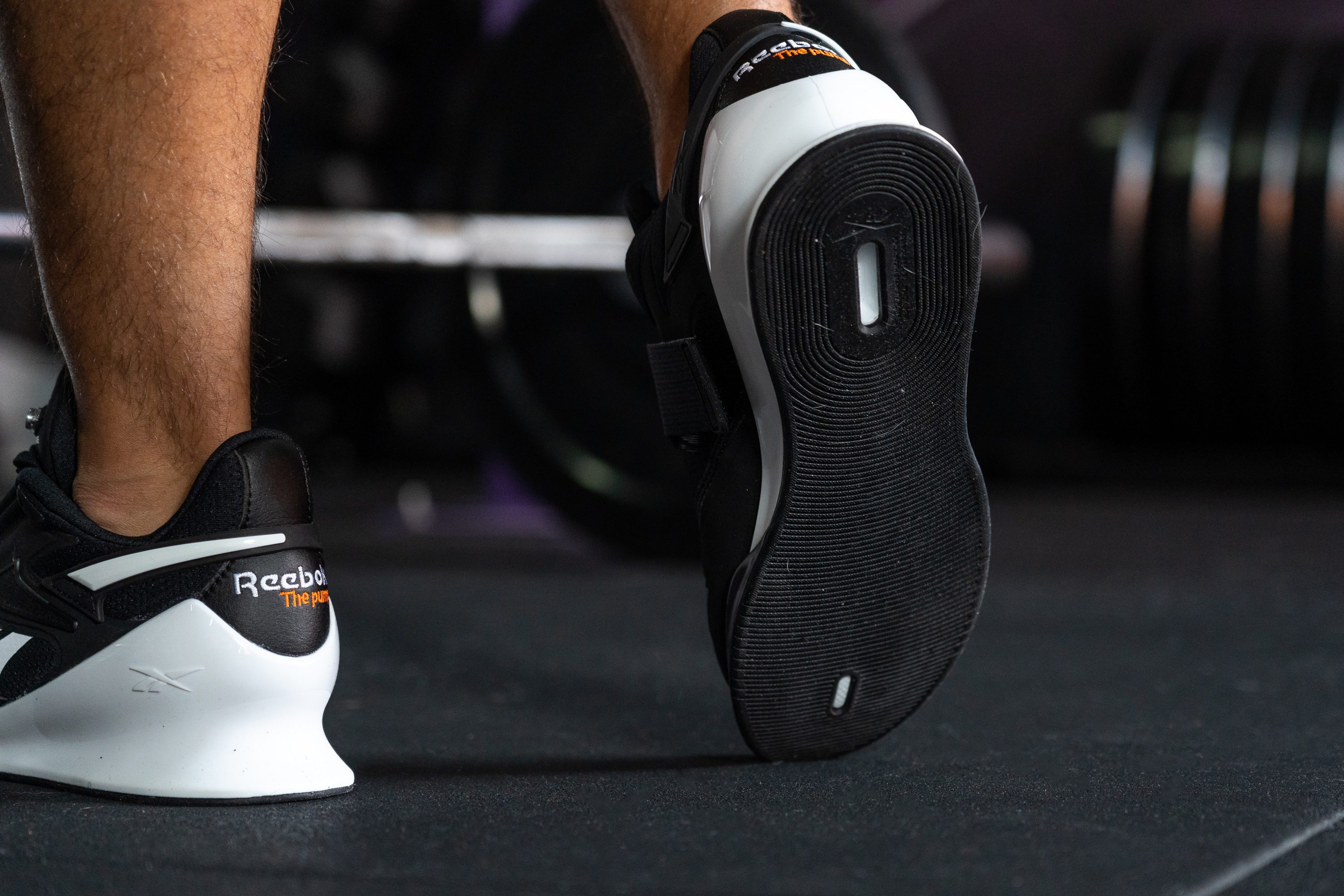
Traction test
The Legacy Lifter III's rubber outsole turned out to be less tacky compared to other lifters and trainers. Its low coefficient of friction (0.22) indicates limited grip on dusty and sweaty gym flooring.
| Legacy Lifter III | 0.22 |
Stability
Lateral stability test
The video below needs no comments. This Reebok lifting shoe makes you feel like a planted tree.
For comparison, here is what the lighter and more forgiving Nike Savaleos lifter looks like in the same test.
Torsional rigidity
Well, we tried.
The sturdiness of the Legacy Lifter III is through the roof. Thus, we rated its torsional rigidity with a maximum 5/5 score.
| Legacy Lifter III | 5 |
| Average | 4.3 |
Heel counter stiffness
The same goes for the heel counter. Incredibly stiff and well-padded, it holds the heel and ankle SO firmly that it even feels a little claustrophobic. But you will appreciate it later when holding a 400-pound bar over your head.
| Legacy Lifter III | 5 |
| Average | 4.8 |
Midsole width - forefoot
Interestingly enough, the Legacy Lifter III achieves such a high level of stability without an excessively wide base.
We used a calliper to measure the widest part of the forefoot at 102 mm. This is about 5 mm narrower than the average.
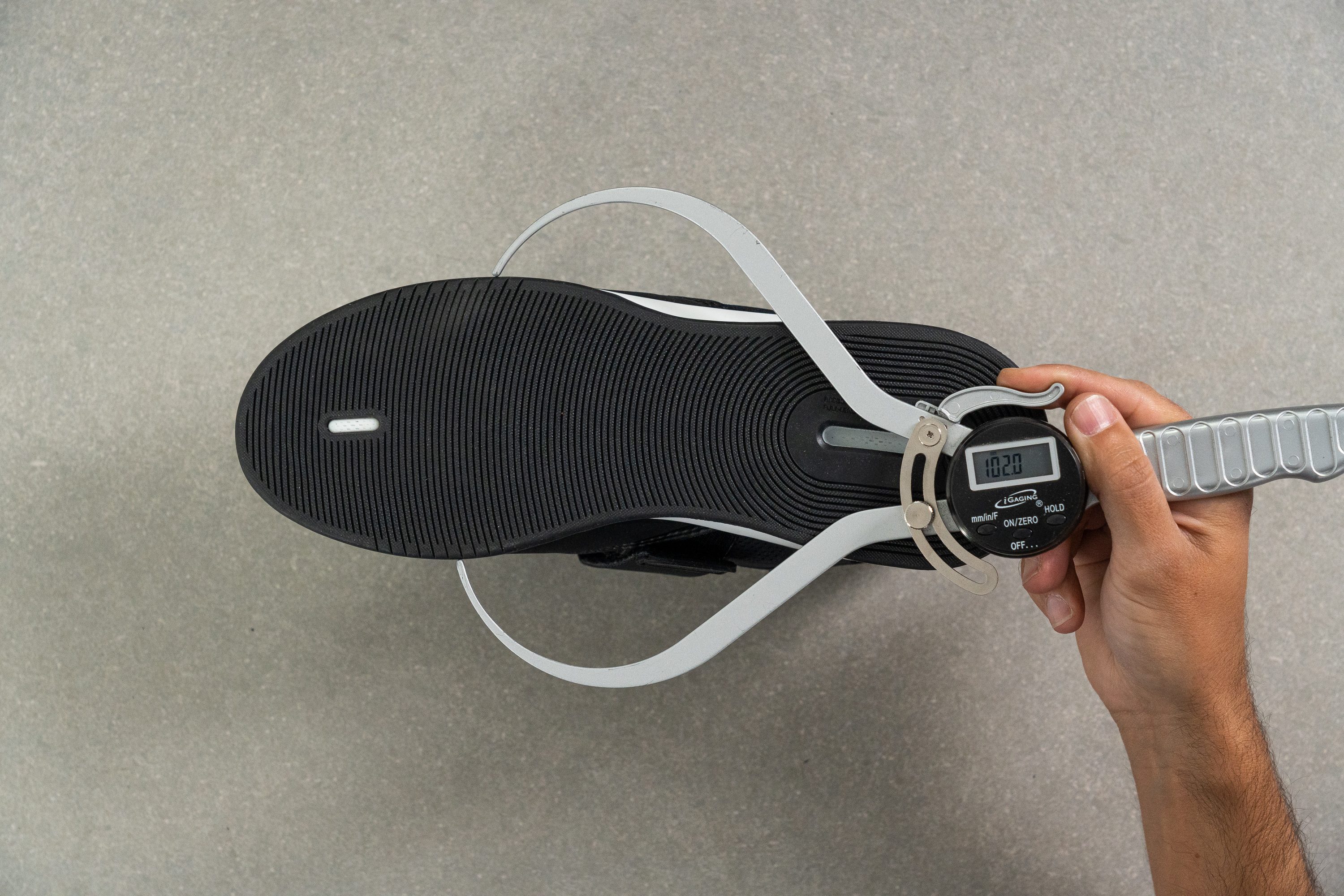
| Legacy Lifter III | 102.0 mm |
| Average | 107.7 mm |
Midsole width - heel
In the widest part of the heel, the platform also has a fairly average width. Our calliper shows 86.4 mm.
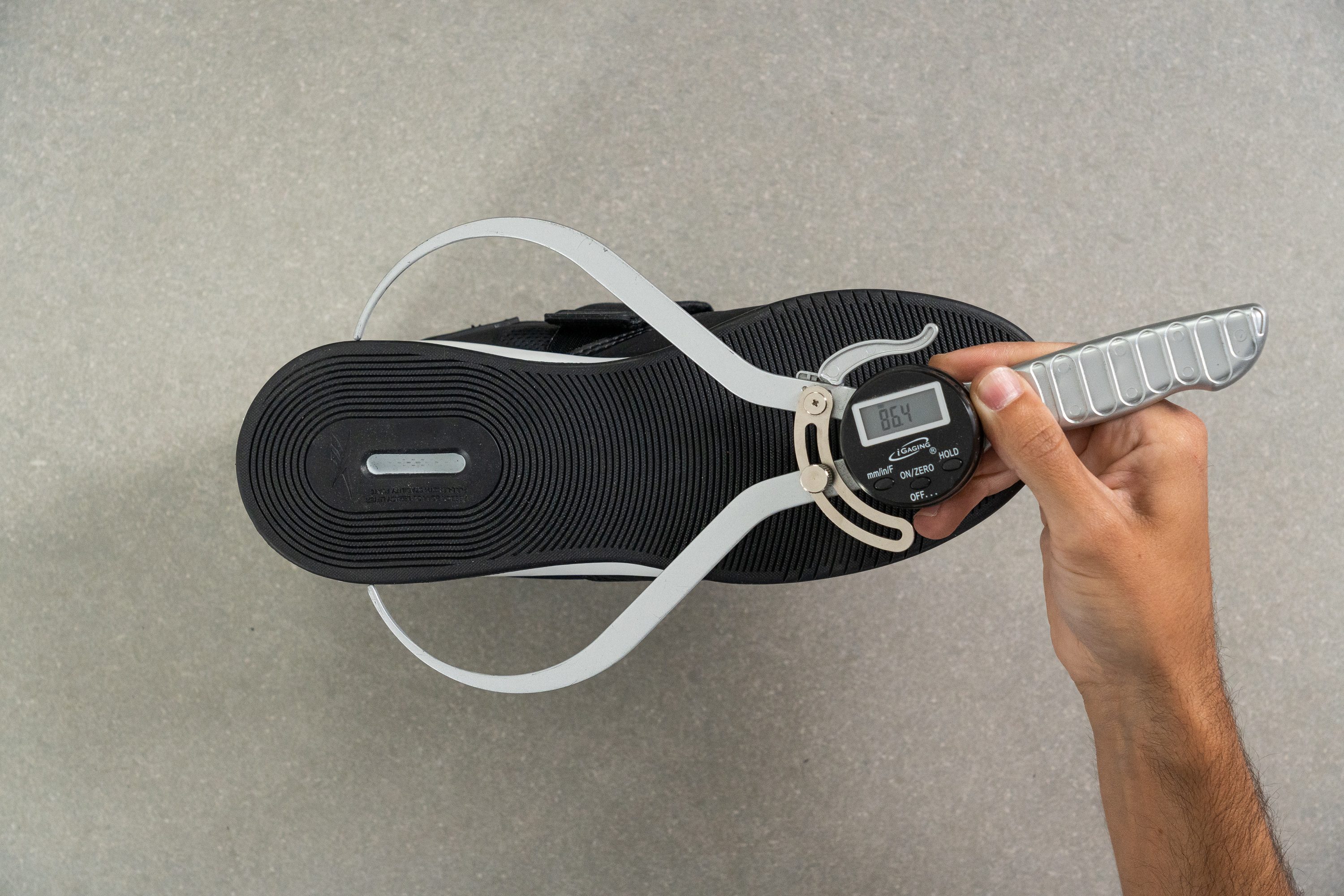
| Legacy Lifter III | 86.4 mm |
| Average | 86.7 mm |
Flexibility / Stiffness
Despite its extra stiff and sturdy appearance, the Legacy Lifter III is actually quite forgiving in the forefoot. We found that this doesn't affect stability but makes walking more bearable in this lifter.
Using a flexibility testing machine, we found that it took only 14.7N to bend the shoe to a 30-degree angle. This is actually about 50% more flexible than the shoe's close competitor, the Nike Romaleos 4 (30.0N)!
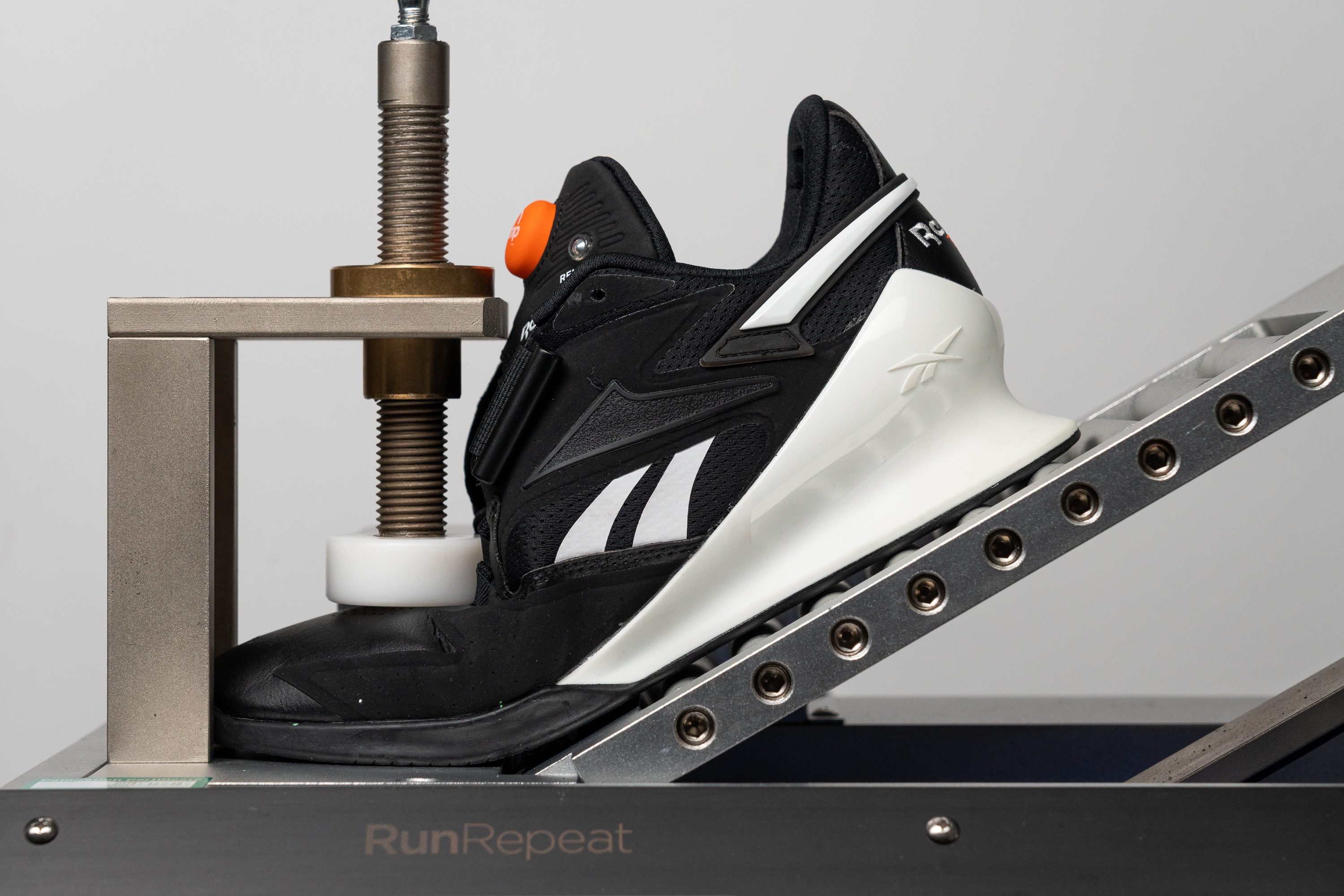
| Legacy Lifter III | 14.7N |
| Average | 15.8N |
Weight
The Reebok Legacy Lifter III is by far the heaviest lifting shoe in our lab!
With a whopping weight of 22.1 oz (627g) in a men's US size 9, it is a whole 3.4 oz (96.4g) heavier than the average!
This is not necessarily a bad thing as some athletes do prefer heavier shoes. It feels like they are pressing you down to the floor for added stability.
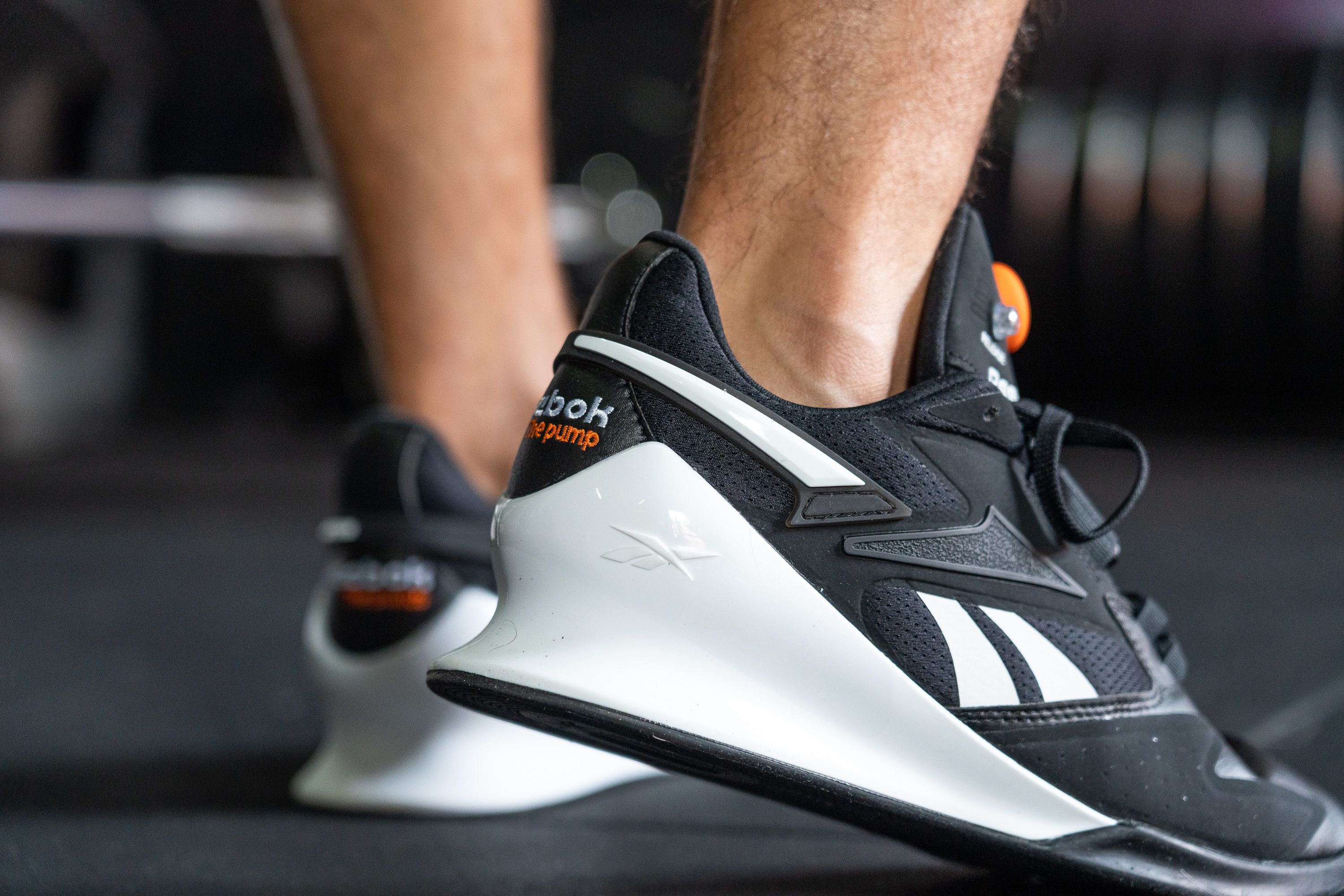
| Legacy Lifter III | 22.1 oz (627g) |
| Average | 17.5 oz (497g) |
Breathability
We didn't expect much aeration from the shoe's leather upper. However, it wasn't as bad as we expected.
Pumping smoke through its upper and assessing how much of it is passing through, we rated the shoe's breathability as 2 out of 5. Not a breathable one but not so toasty either.
Perforations on the toebox do help to freshen up the interiors. They can be seen in our transparency test below.
| Legacy Lifter III | 2 |
| Average | 2 |
Durability
Toebox durability
With its genuine leather upper, our Dremel test was a joke to the Legacy Lifter III. After 12 seconds of drilling the toebox, all we got was a minor scuff!
The shoe deserves the highest 5 out of 5 score for toebox durability.
This is absolutely mind-blowing! Especially when you compare the results of the same test performed on the Nike Romaleos 4. There is a see-through hole right there!
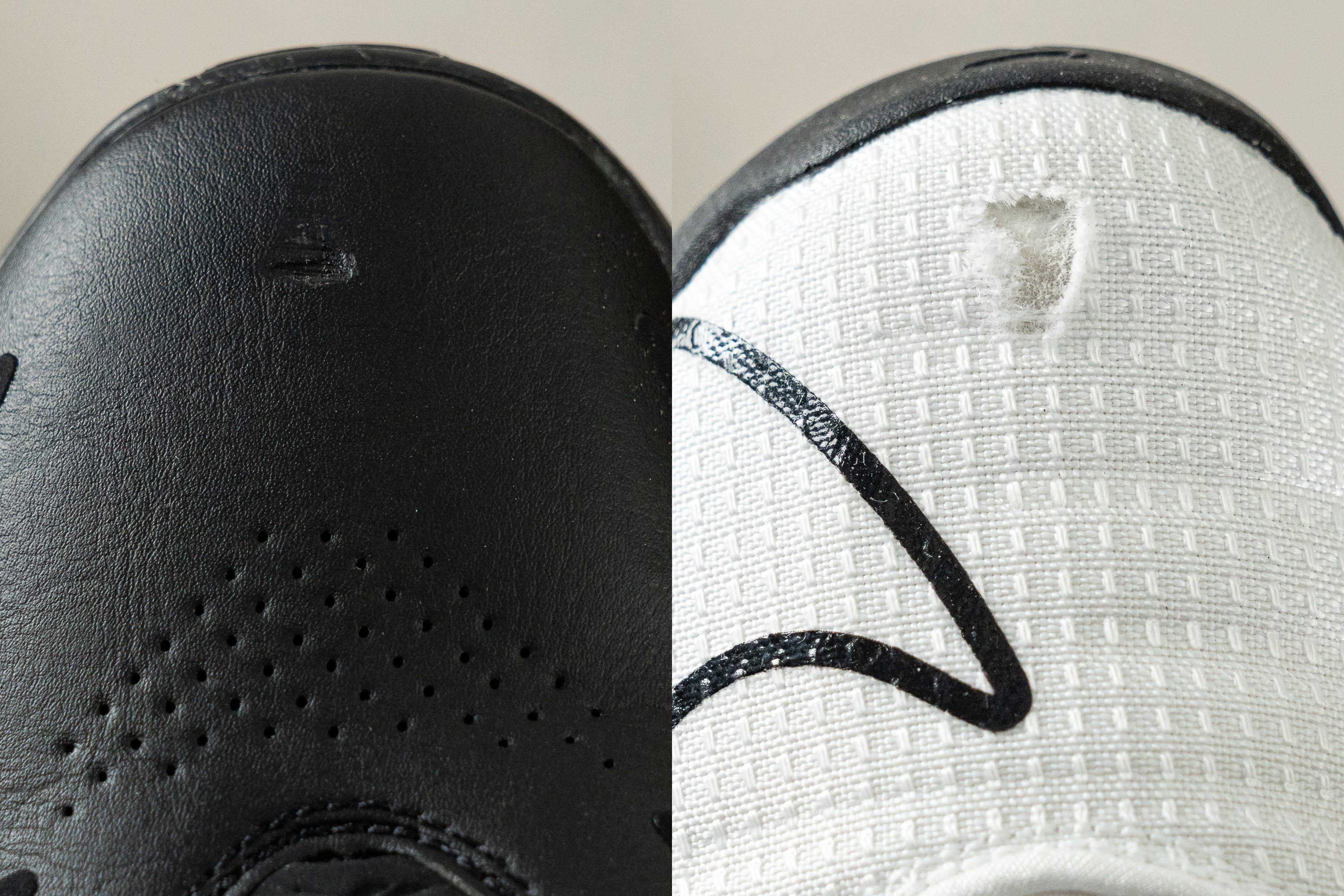
| Legacy Lifter III | 5 |
| Average | 3.5 |
Heel padding durability
The heel padding stood up just fine too! This is especially surprising given that the lining is usually quite delicate here.
Drilling the inside of the heel collar for 4 seconds, we saw very little wear on the material. The Lifter receives another high score on durability - 4 out of 5!
| Legacy Lifter III | 4 |
| Average | 3.6 |
Outsole hardness
One of the parameters associated with outsole durability is its hardness.
To be honest, we didn't expect to see a lower-than-average reading for the Legacy Lifter III on our durometer. It showed 79.5 HC whereas the average of lifting shoes is 85 HC (as of writing this review).
But the upside is that a softer outsole feels grippier on rubber mats and wooden platforms.
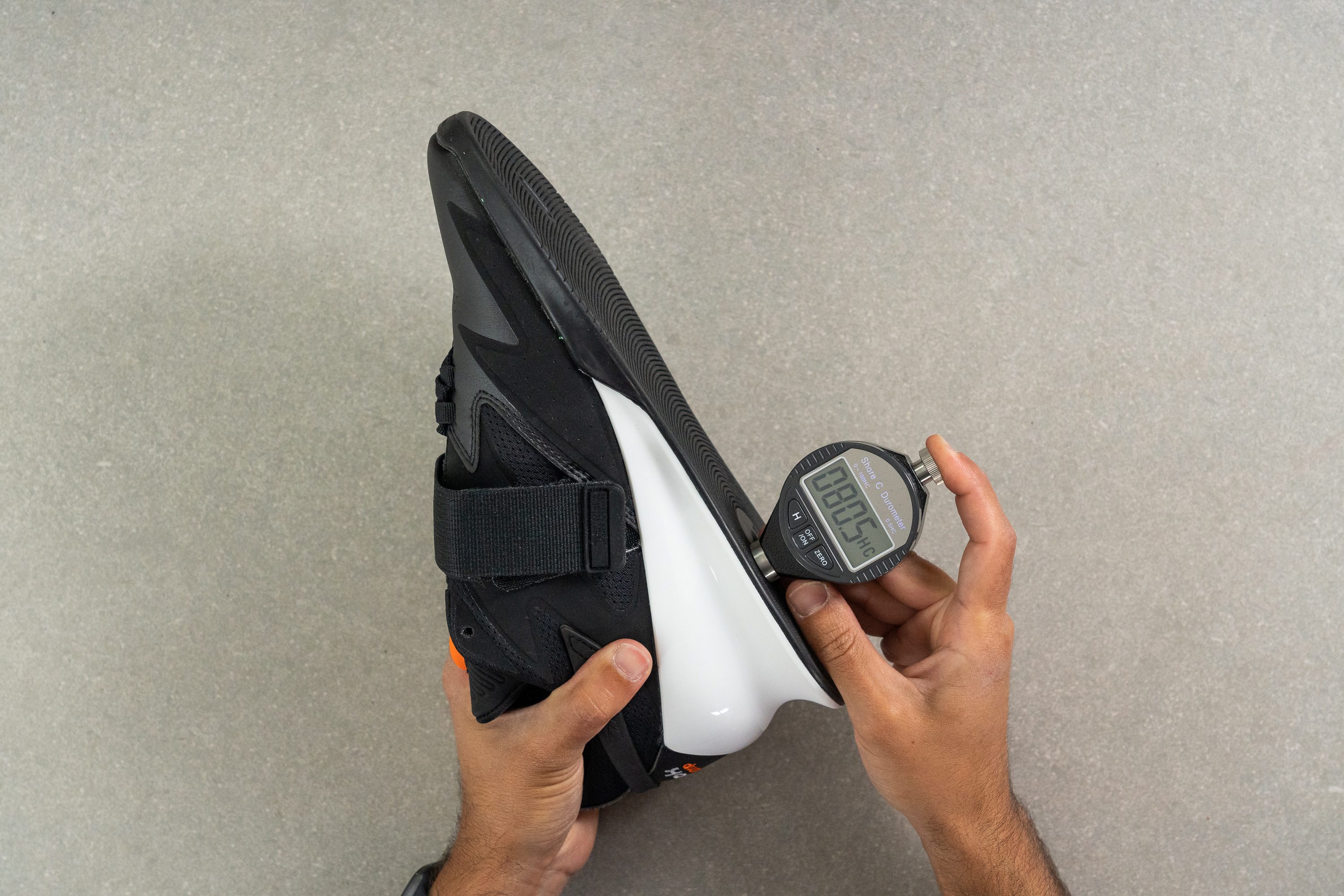
| Legacy Lifter III | 79.5 HC |
| Average | 85.1 HC |
Outsole thickness
The outsole is also not very thick on the Legacy Lifter III. Our calliper shows 3.4 mm whereas the average is 4 mm. Not too big of a difference though.
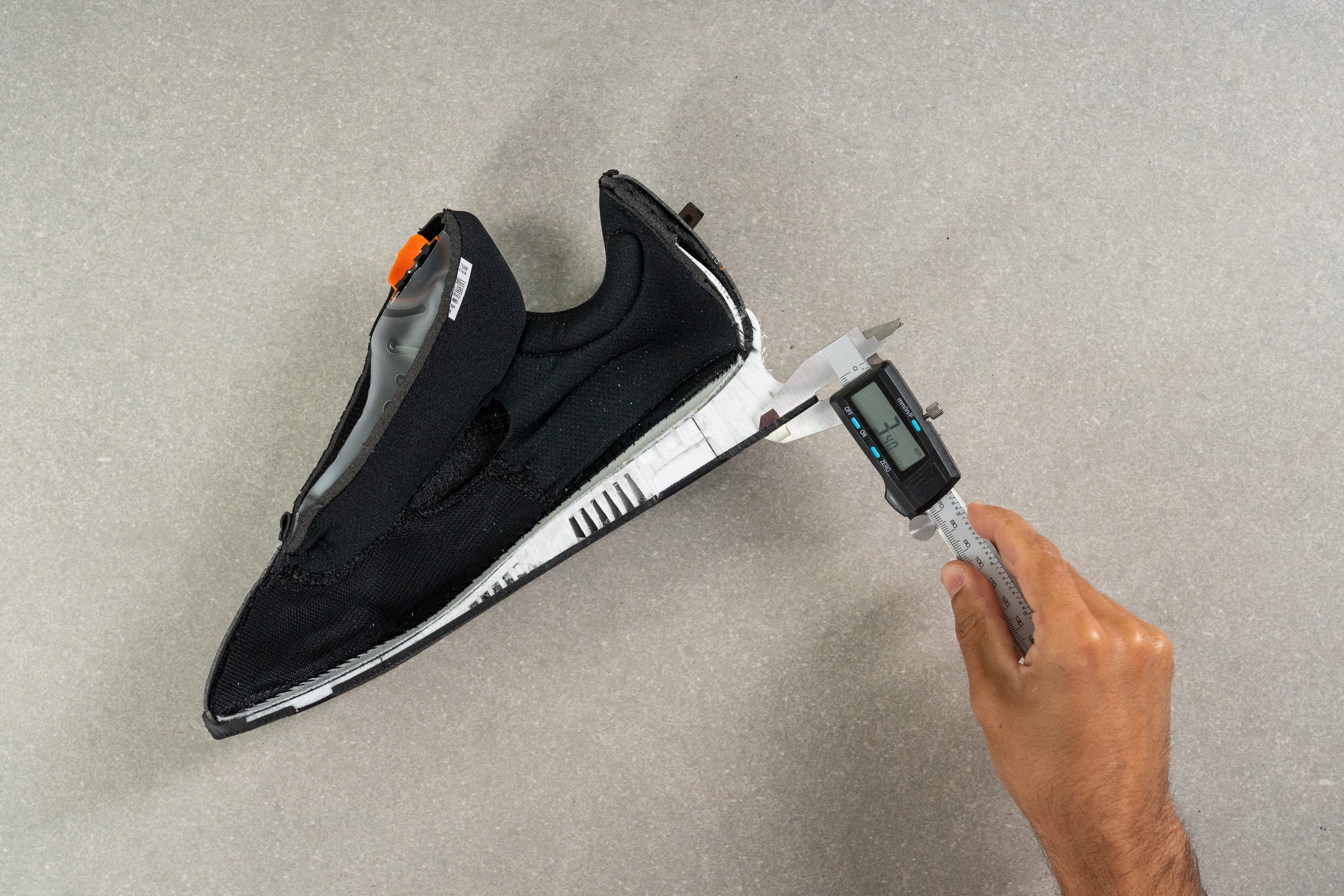
| Legacy Lifter III | 3.4 mm |
| Average | 3.6 mm |
Misc
Insole thickness
A well-padded insole buffers the foot from the rock-hard sole. We measured its thickness at 6.7 mm, which is quite standard for lifting shoes.
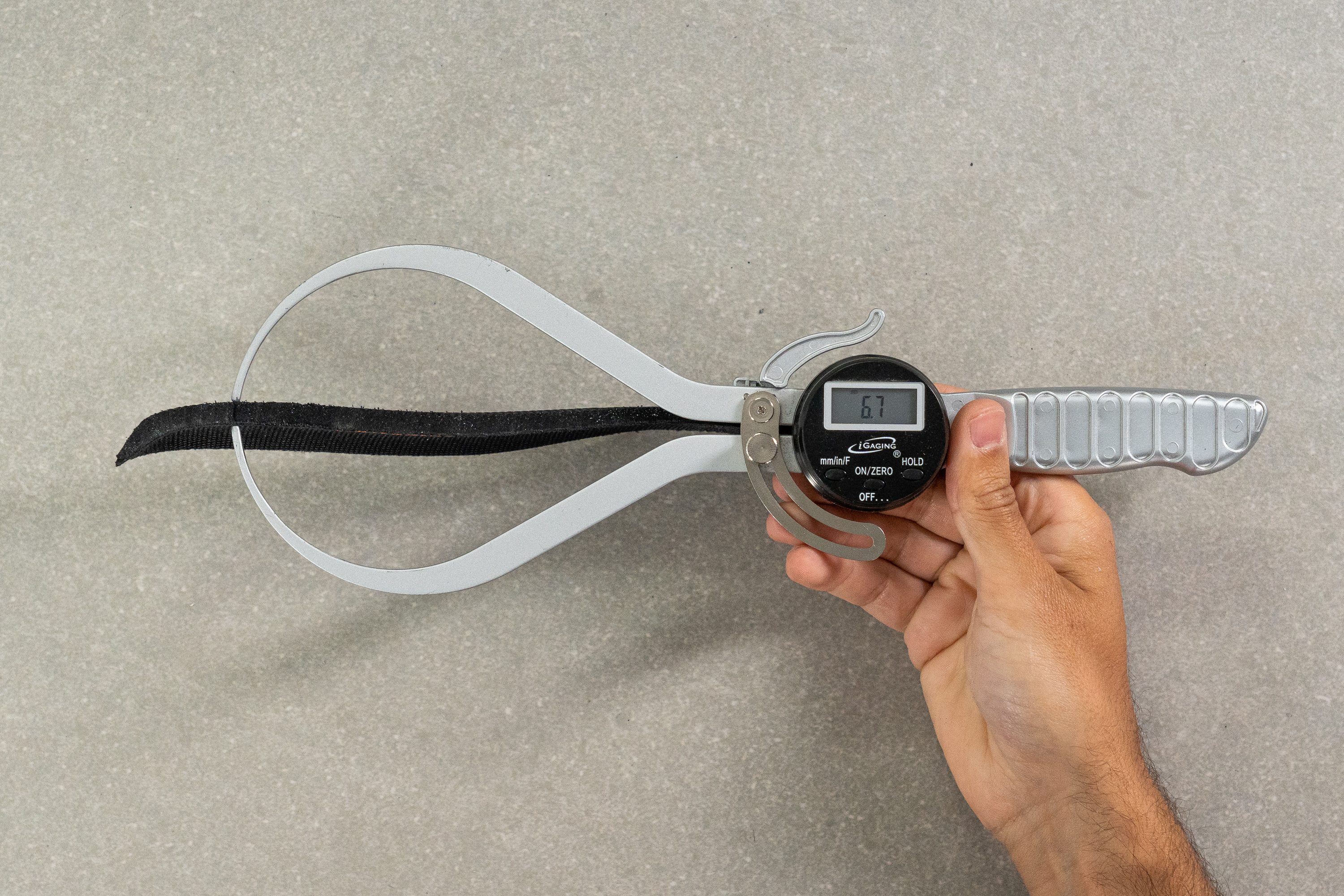
| Legacy Lifter III | 6.7 mm |
| Average | 5.9 mm |
Removable insole
The insole is removable and can be replaced with an insert of your chocie.
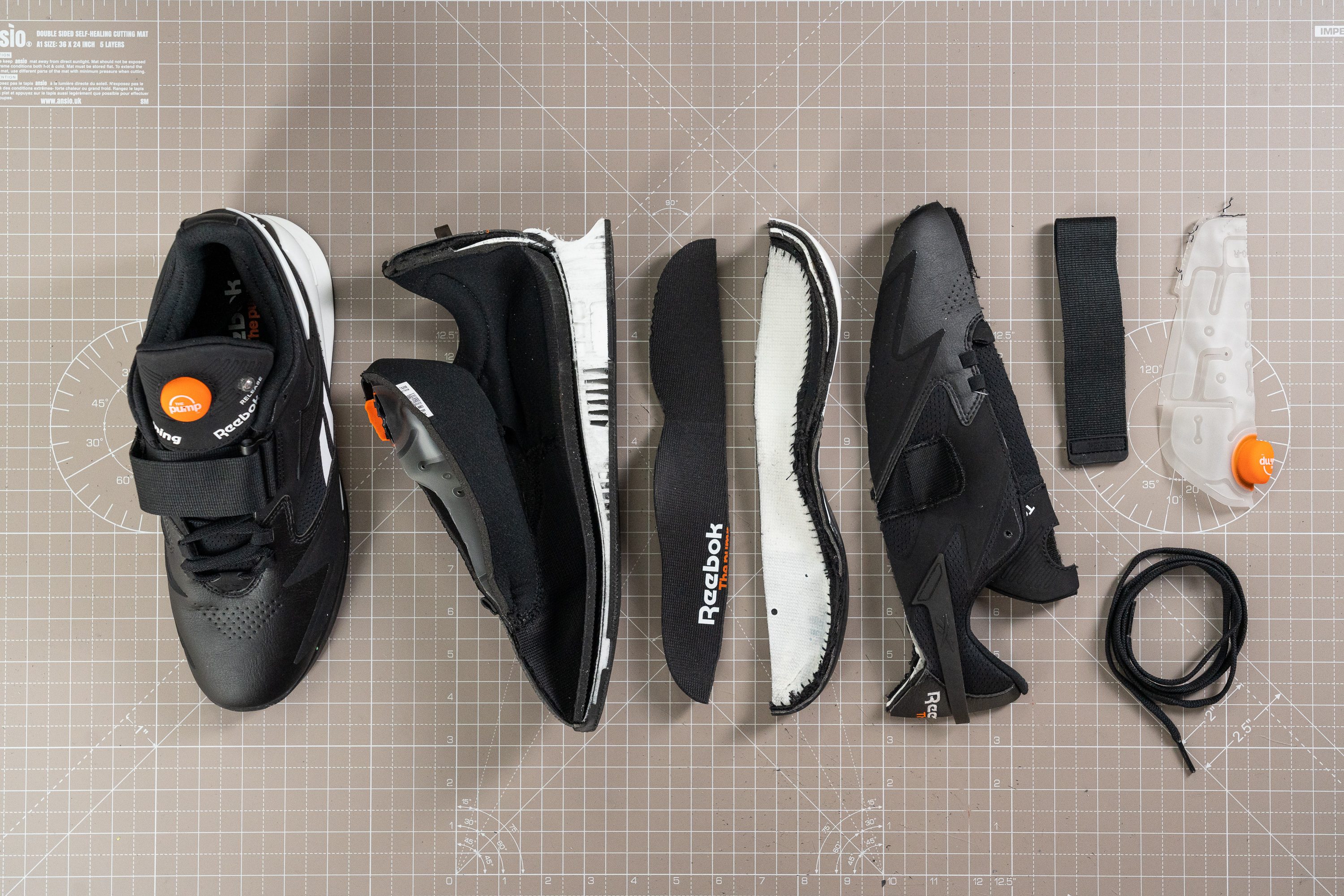
| Legacy Lifter III | Yes |
Tongue padding
In addition, the tongue itself is also quite well-padded in the Lifter III. We measured its thickness at 6.6 mm, which is a millimetre thicker than average.
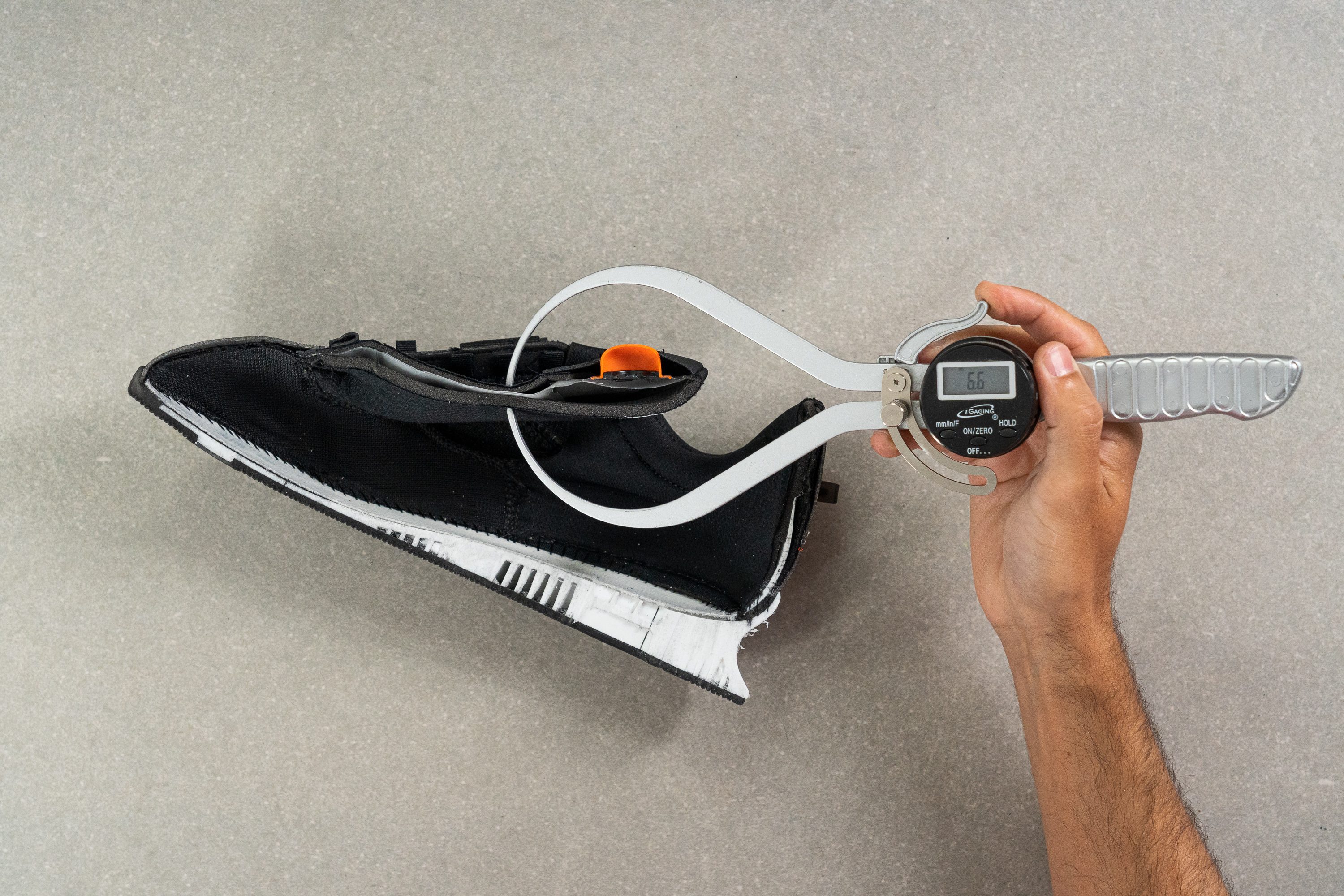
| Legacy Lifter III | 6.6 mm |
| Average | 5.0 mm |
Tongue: gusset type
The tongue is not gusseted on the Legacy Lifter III. But it is not a problem at all thanks to all the other components of the foot containment.
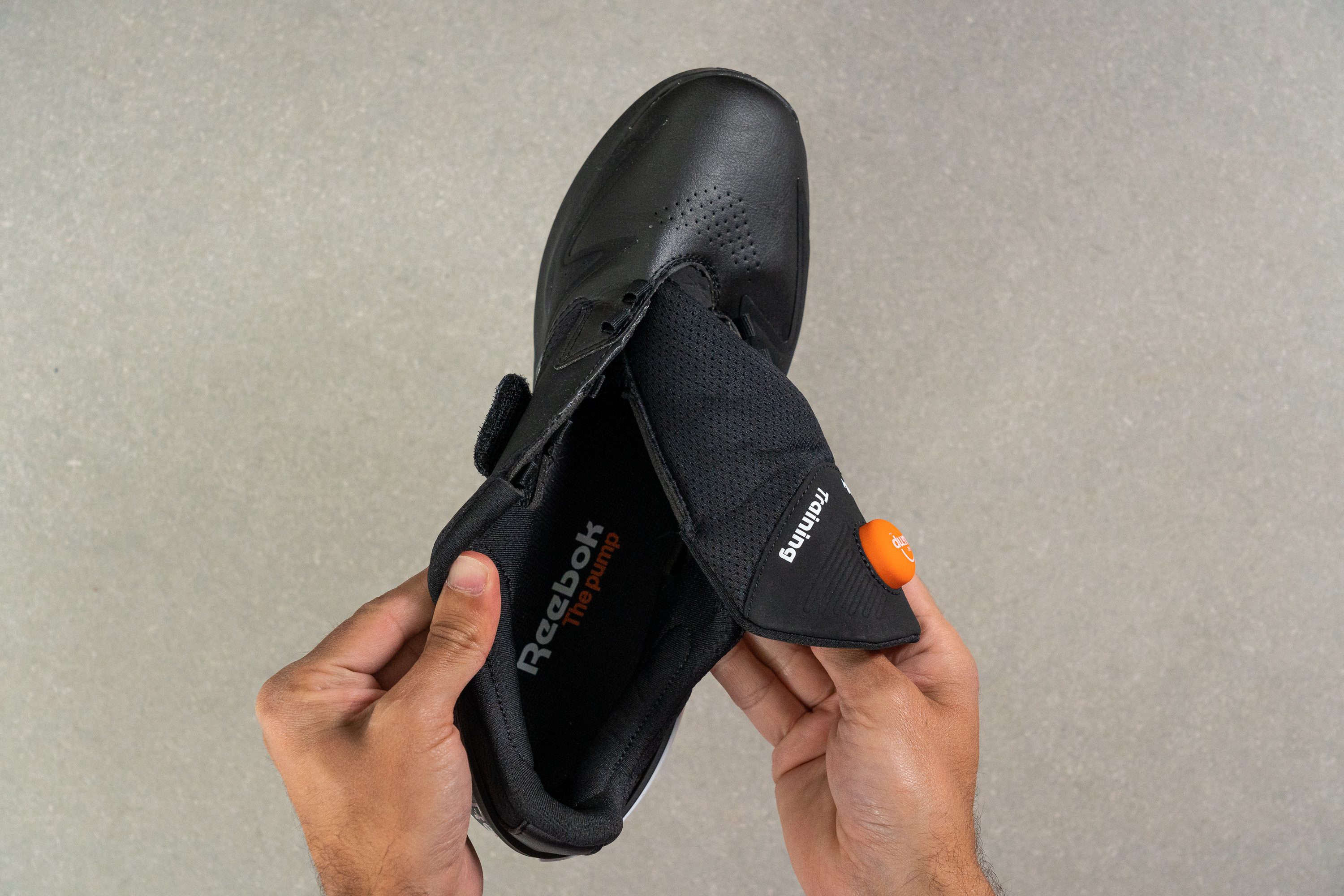
| Legacy Lifter III | None |
Heel tab
The heel tab is not present but you can use the extended heel collar to assist in putting the shoe on.
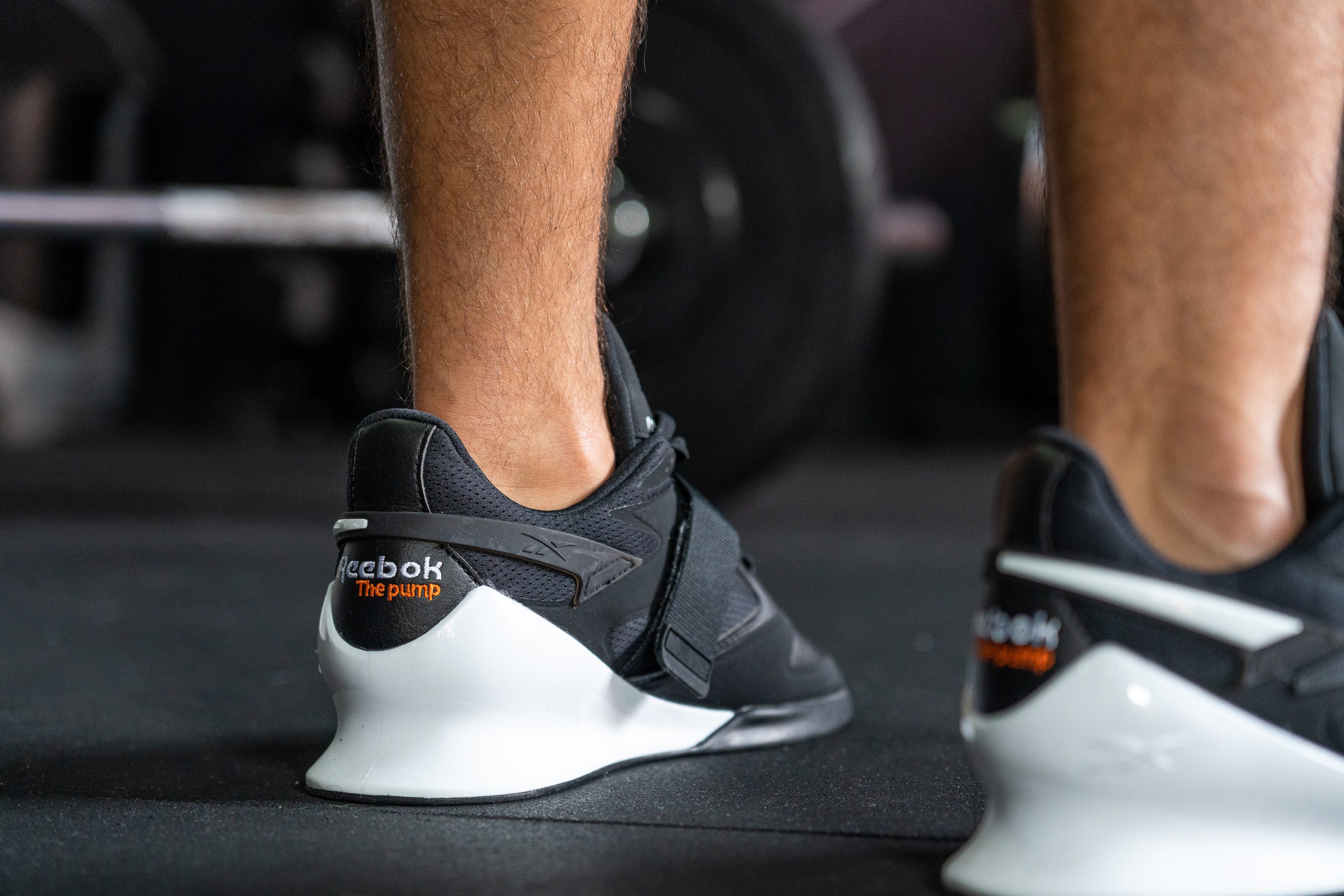
| Legacy Lifter III | None |
